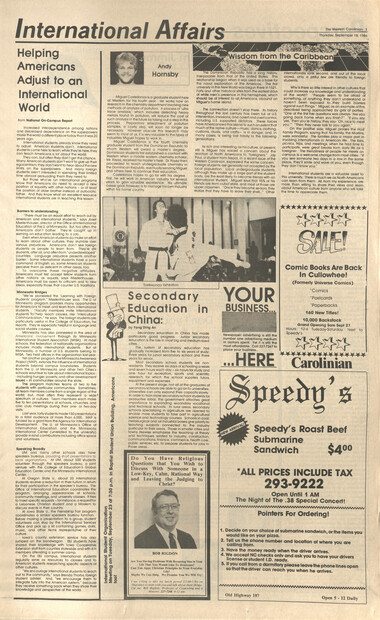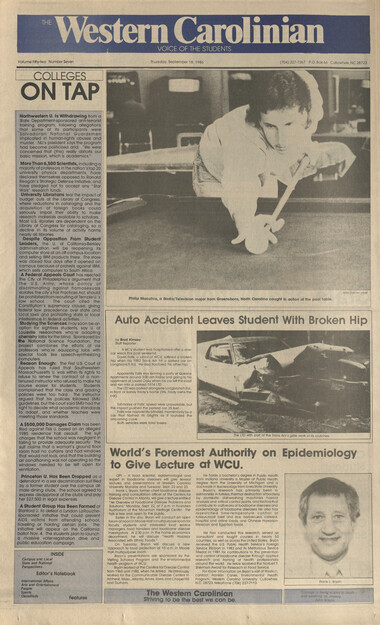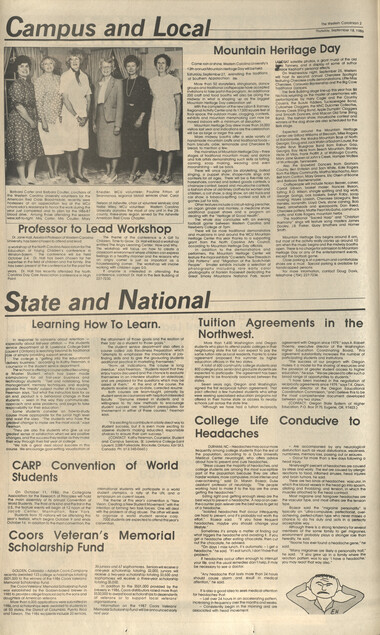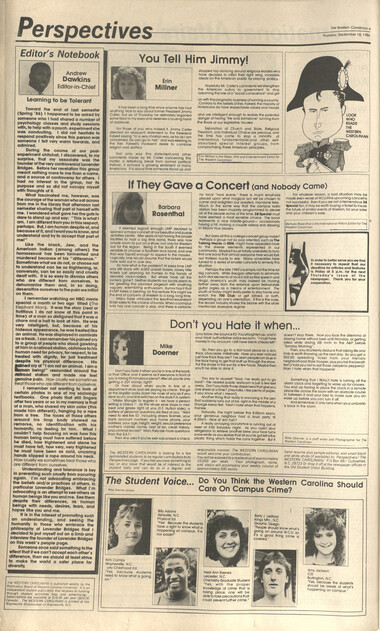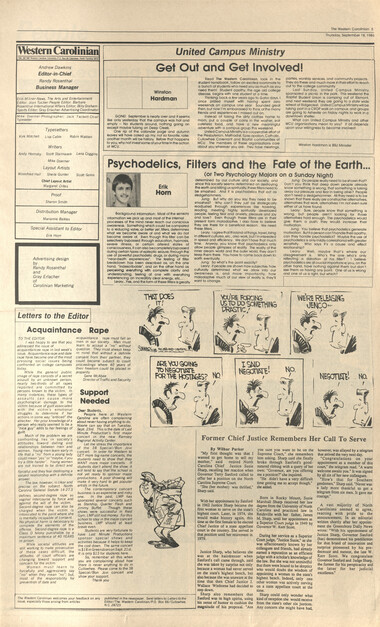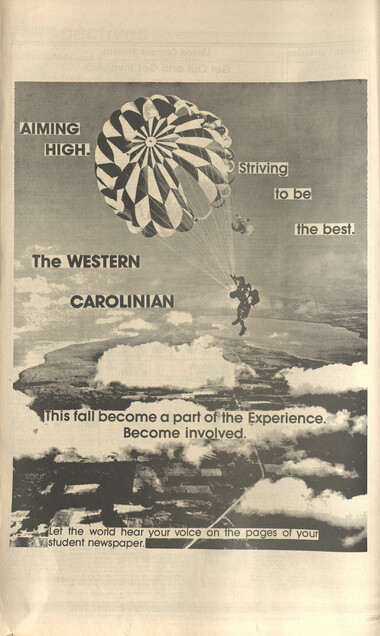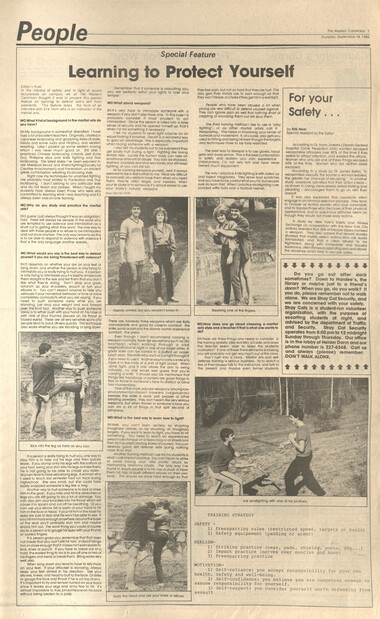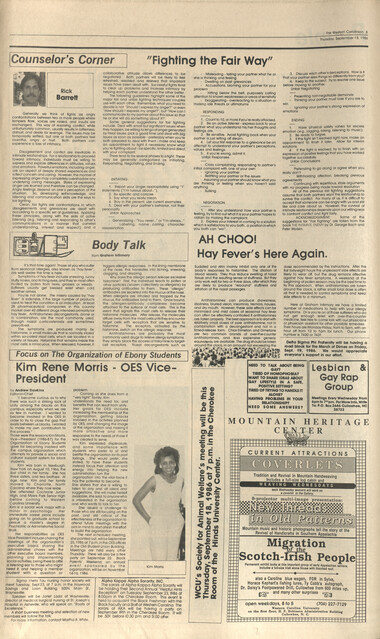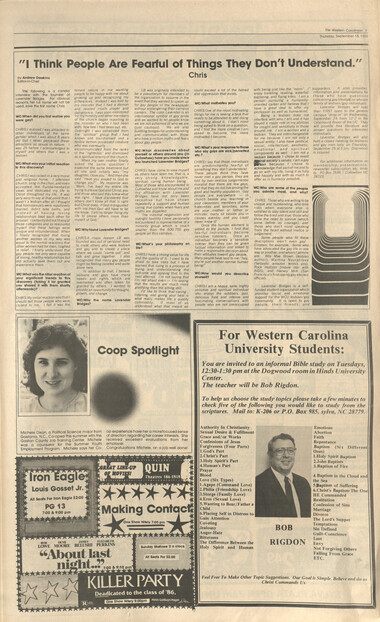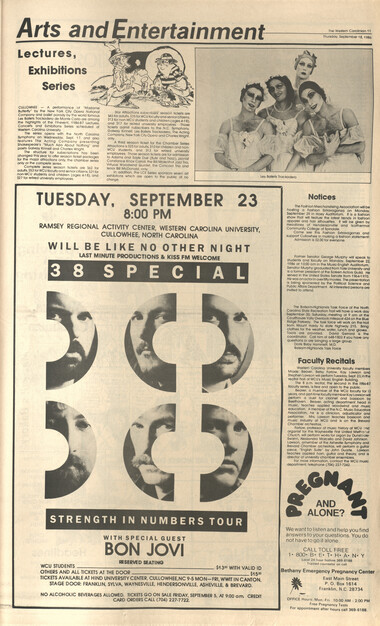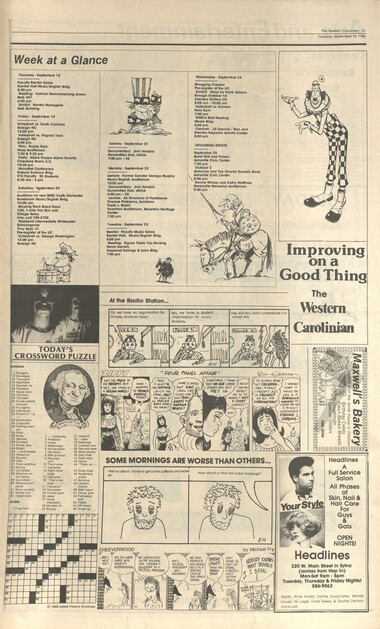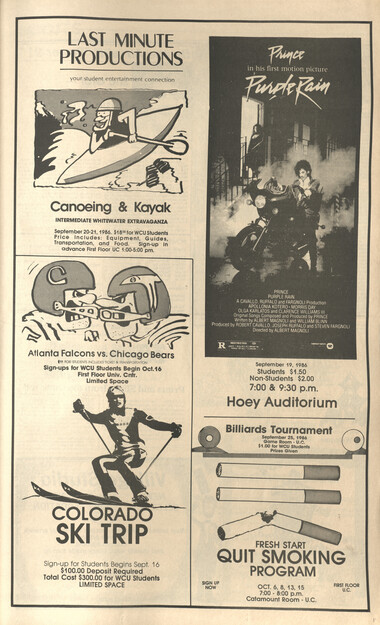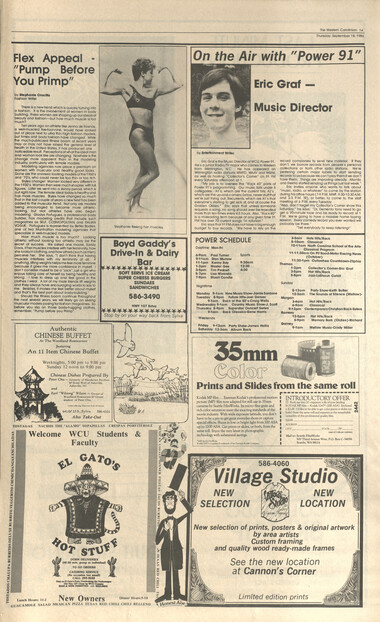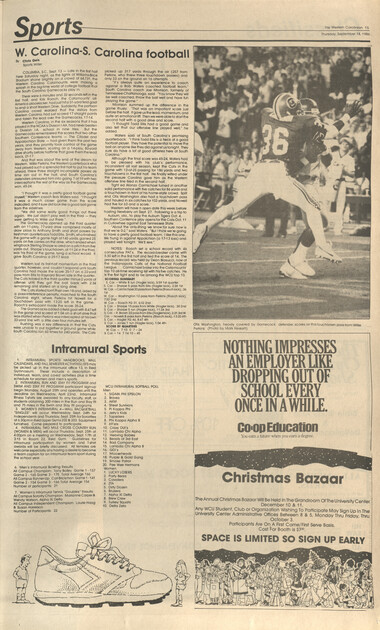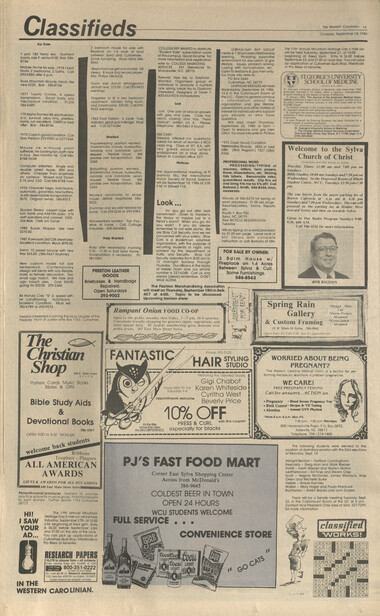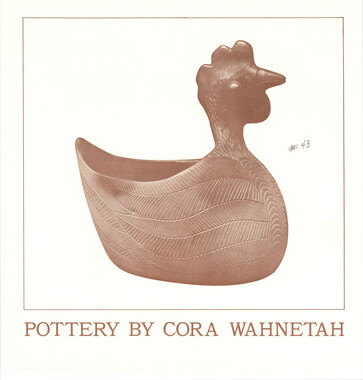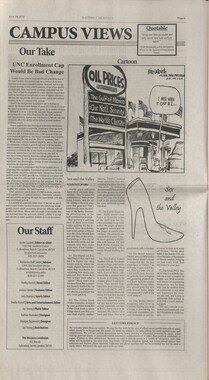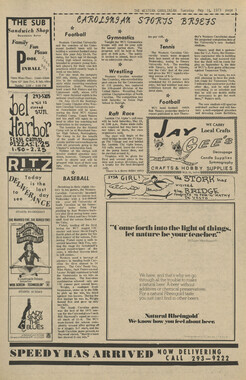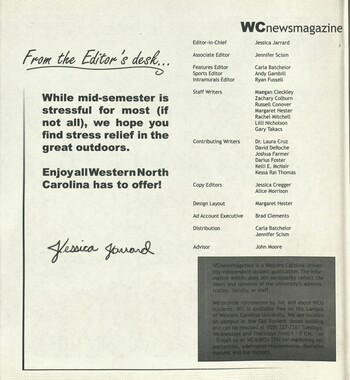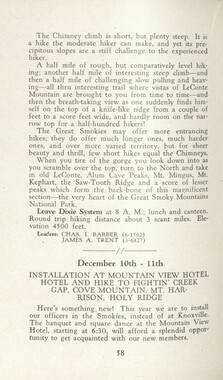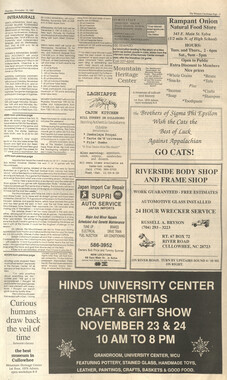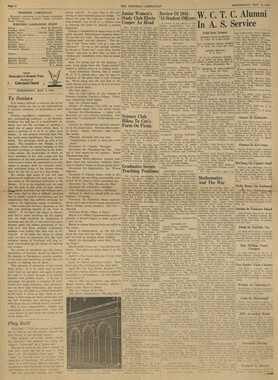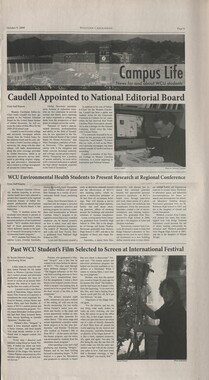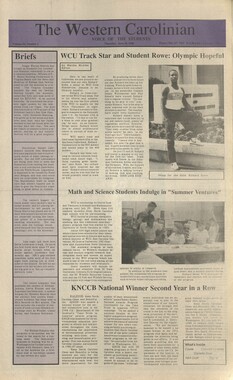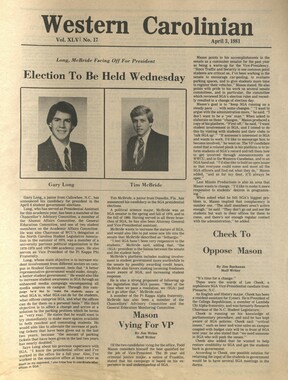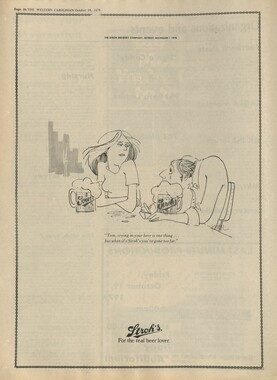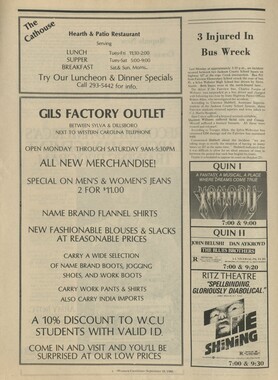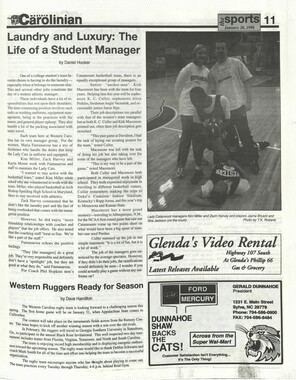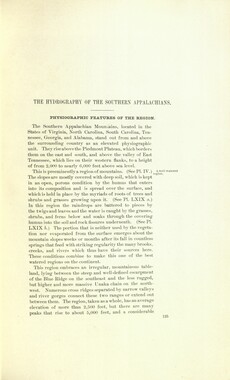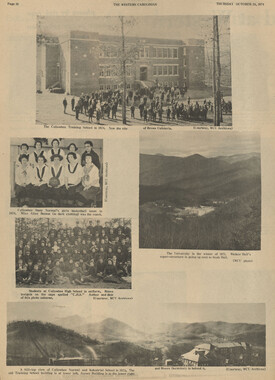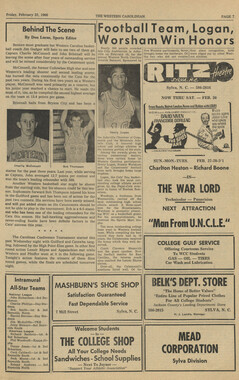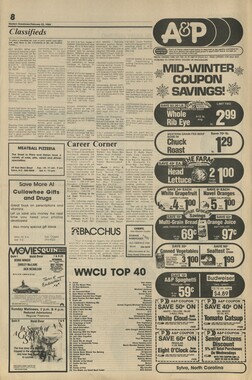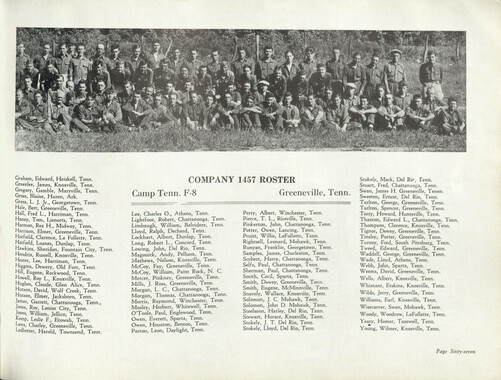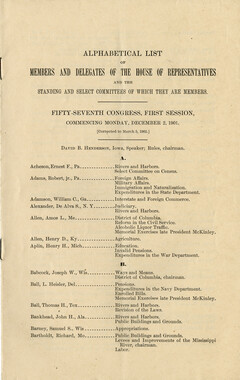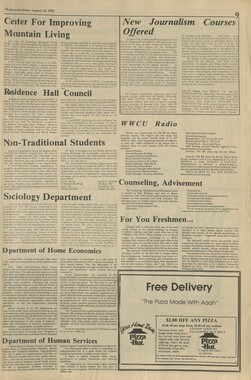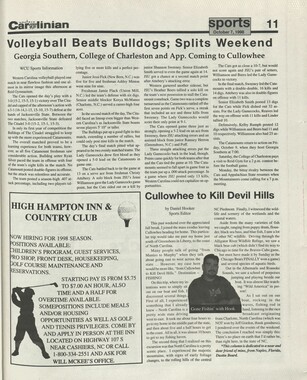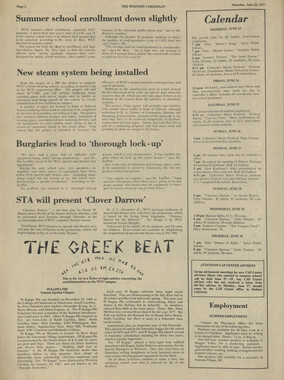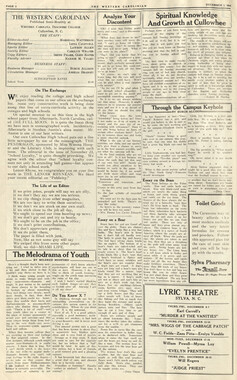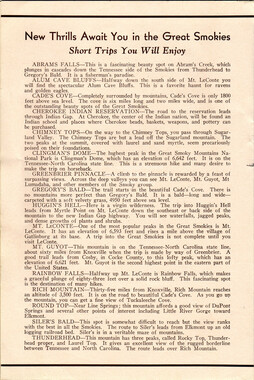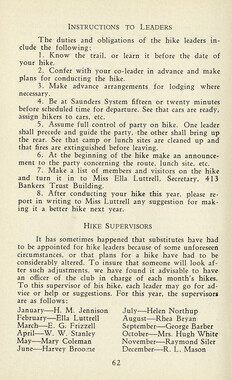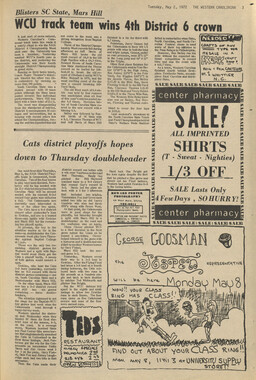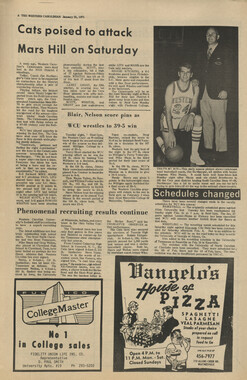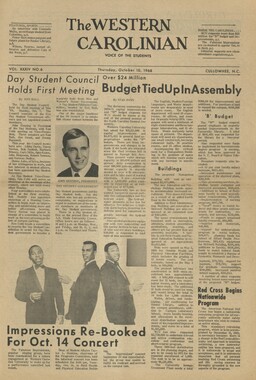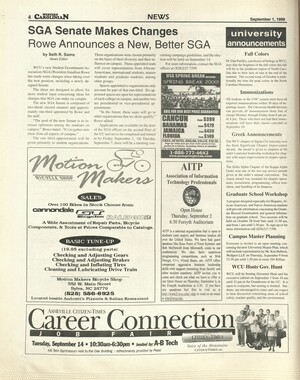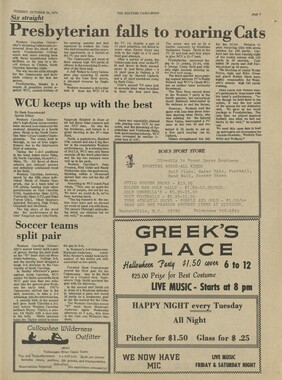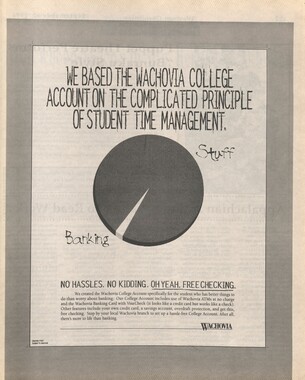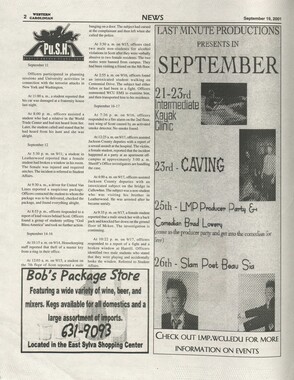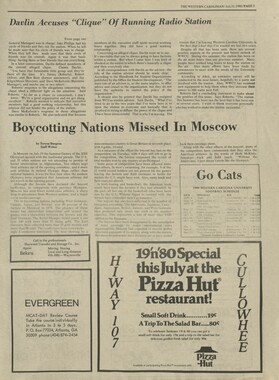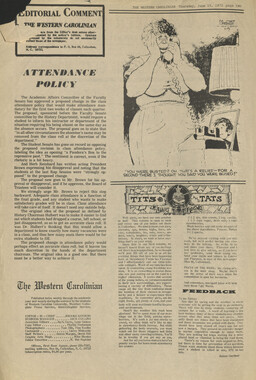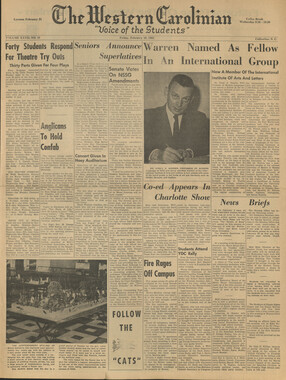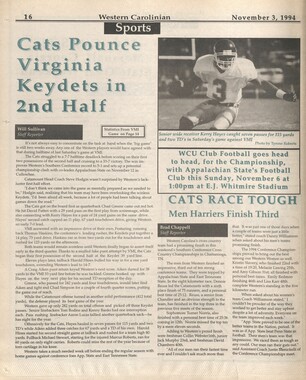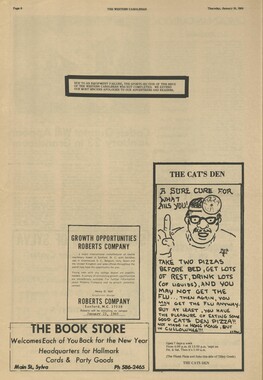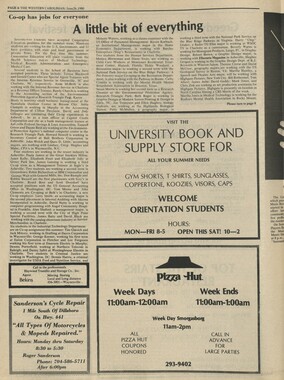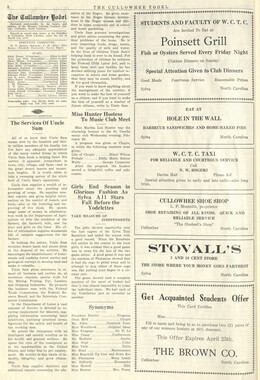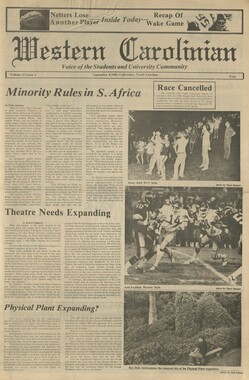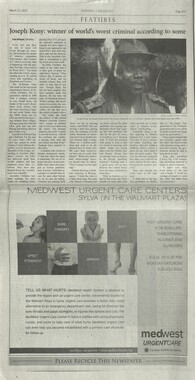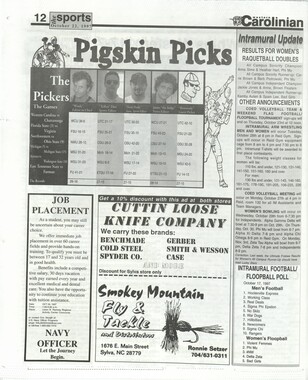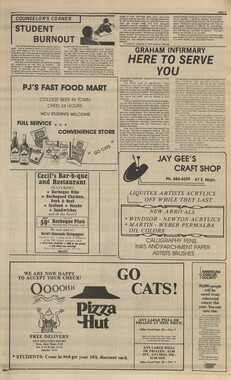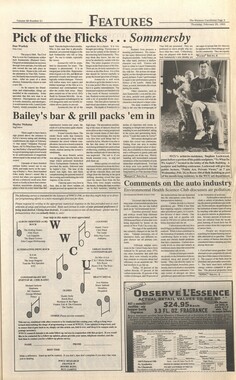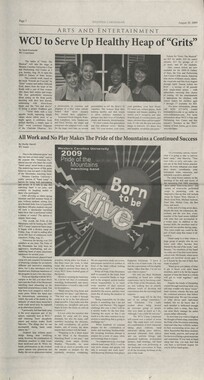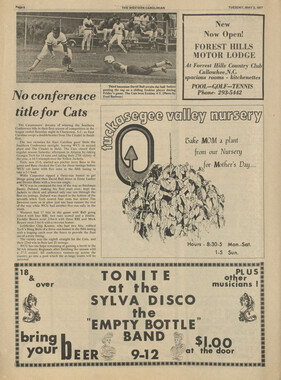Western Carolina University (21)
View all
- Canton Champion Fibre Company (2308)
- Cherokee Traditions (291)
- Civil War in Southern Appalachia (165)
- Craft Revival (1942)
- George Masa Collection (137)
- Great Smoky Mountains - A Park for America (3080)
- Highlights from Western Carolina University (422)
- Horace Kephart (973)
- Journeys Through Jackson (159)
- LGBTQIA+ Archive of Jackson County (89)
- Oral Histories of Western North Carolina (317)
- Picturing Appalachia (6617)
- Stories of Mountain Folk (413)
- Travel Western North Carolina (153)
- Western Carolina University Fine Art Museum Vitreograph Collection (129)
- Western Carolina University Herbarium (92)
- Western Carolina University: Making Memories (738)
- Western Carolina University Publications (2491)
- Western Carolina University Restricted Electronic Theses and Dissertations (146)
- Western North Carolina Regional Maps (71)
- World War II in Southern Appalachia (131)
University of North Carolina Asheville (6)
View all
- Allanstand Cottage Industries (62)
- Appalachian National Park Association (53)
- Bennett, Kelly, 1890-1974 (1463)
- Berry, Walter (76)
- Brasstown Carvers (40)
- Carver, George Washington, 1864?-1943 (26)
- Cathey, Joseph, 1803-1874 (1)
- Champion Fibre Company (233)
- Champion Paper and Fibre Company (297)
- Cherokee Indian Fair Association (16)
- Cherokee Language Program (22)
- Crowe, Amanda (40)
- Edmonston, Thomas Benton, 1842-1907 (7)
- Ensley, A. L. (Abraham Lincoln), 1865-1948 (275)
- Fromer, Irving Rhodes, 1913-1994 (70)
- George Butz (BFS 1907) (46)
- Goodrich, Frances Louisa (120)
- Grant, George Alexander, 1891-1964 (96)
- Heard, Marian Gladys (60)
- Kephart, Calvin, 1883-1969 (15)
- Kephart, Horace, 1862-1931 (313)
- Kephart, Laura, 1862-1954 (67)
- Laney, Gideon Thomas, 1889-1976 (439)
- Masa, George, 1881-1933 (61)
- McElhinney, William Julian, 1896-1953 (44)
- Niggli, Josephina, 1910-1983 (10)
- North Carolina Park Commission (105)
- Osborne, Kezia Stradley (9)
- Owens, Samuel Robert, 1918-1995 (11)
- Penland Weavers and Potters (36)
- Roberts, Vivienne (15)
- Roth, Albert, 1890-1974 (142)
- Schenck, Carl Alwin, 1868-1955 (1)
- Sherrill's Photography Studio (2565)
- Southern Highland Handicraft Guild (127)
- Southern Highlanders, Inc. (71)
- Stalcup, Jesse Bryson (46)
- Stearns, I. K. (213)
- Thompson, James Edward, 1880-1976 (226)
- United States. Indian Arts and Crafts Board (130)
- USFS (683)
- Vance, Zebulon Baird, 1830-1894 (1)
- Weaver, Zebulon, 1872-1948 (58)
- Western Carolina College (230)
- Western Carolina Teachers College (282)
- Western Carolina University (2008)
- Western Carolina University. Mountain Heritage Center (18)
- Whitman, Walt, 1819-1892 (10)
- Wilburn, Hiram Coleman, 1880-1967 (73)
- Williams, Isadora (3)
- Cain, Doreyl Ammons (0)
- Crittenden, Lorraine (0)
- Rhodes, Judy (0)
- Smith, Edward Clark (0)
- Appalachian Region, Southern (3032)
- Asheville (N.C.) (1945)
- Avery County (N.C.) (26)
- Blount County (Tenn.) (195)
- Buncombe County (N.C.) (1680)
- Cherokee County (N.C.) (283)
- Clay County (N.C.) (556)
- Graham County (N.C.) (238)
- Great Smoky Mountains National Park (N.C. and Tenn.) (525)
- Haywood County (N.C.) (3573)
- Henderson County (N.C.) (70)
- Jackson County (N.C.) (4924)
- Knox County (Tenn.) (35)
- Knoxville (Tenn.) (13)
- Lake Santeetlah (N.C.) (10)
- Macon County (N.C.) (421)
- Madison County (N.C.) (216)
- McDowell County (N.C.) (39)
- Mitchell County (N.C.) (135)
- Polk County (N.C.) (35)
- Qualla Boundary (982)
- Rutherford County (N.C.) (78)
- Swain County (N.C.) (2185)
- Transylvania County (N.C.) (270)
- Watauga County (N.C.) (12)
- Waynesville (N.C.) (86)
- Yancey County (N.C.) (72)
- Aerial Photographs (3)
- Aerial Views (60)
- Albums (books) (4)
- Articles (1)
- Artifacts (object Genre) (228)
- Bibliographies (1)
- Biography (general Genre) (2)
- Cards (information Artifacts) (38)
- Clippings (information Artifacts) (192)
- Copybooks (instructional Materials) (3)
- Crafts (art Genres) (622)
- Depictions (visual Works) (21)
- Design Drawings (1)
- Digital Moving Image Formats (2)
- Drawings (visual Works) (185)
- Envelopes (101)
- Exhibitions (events) (1)
- Facsimiles (reproductions) (1)
- Fiction (general Genre) (4)
- Financial Records (12)
- Fliers (printed Matter) (67)
- Glass Plate Negatives (381)
- Guidebooks (2)
- Internegatives (10)
- Interviews (822)
- Land Surveys (102)
- Letters (correspondence) (1045)
- Manuscripts (documents) (618)
- Maps (documents) (177)
- Memorandums (25)
- Minutes (administrative Records) (59)
- Negatives (photographs) (6090)
- Newsletters (1290)
- Newspapers (2)
- Notebooks (8)
- Occupation Currency (1)
- Paintings (visual Works) (1)
- Pen And Ink Drawings (1)
- Periodicals (194)
- Personal Narratives (10)
- Photographs (12977)
- Plans (maps) (1)
- Poetry (6)
- Portraits (4568)
- Postcards (329)
- Programs (documents) (181)
- Publications (documents) (2444)
- Questionnaires (65)
- Relief Prints (26)
- Sayings (literary Genre) (1)
- Scrapbooks (282)
- Sheet Music (2)
- Slides (photographs) (402)
- Songs (musical Compositions) (2)
- Sound Recordings (801)
- Specimens (92)
- Speeches (documents) (18)
- Tintypes (photographs) (8)
- Transcripts (328)
- Text Messages (0)
- A.L. Ensley Collection (275)
- Appalachian Industrial School Records (7)
- Appalachian National Park Association Records (336)
- Axley-Meroney Collection (2)
- Bayard Wootten Photograph Collection (20)
- Bethel Rural Community Organization Collection (7)
- Blumer Collection (5)
- C.W. Slagle Collection (20)
- Canton Area Historical Museum (2110)
- Carlos C. Campbell Collection (462)
- Cataloochee History Project (64)
- Cherokee Studies Collection (4)
- Daisy Dame Photograph Album (5)
- Daniel Boone VI Collection (1)
- Doris Ulmann Photograph Collection (112)
- Elizabeth H. Lasley Collection (1)
- Elizabeth Woolworth Szold Fleharty Collection (4)
- Frank Fry Collection (95)
- George Masa Collection (173)
- Gideon Laney Collection (452)
- Hazel Scarborough Collection (2)
- Hiram C. Wilburn Papers (28)
- Historic Photographs Collection (236)
- Horace Kephart Collection (861)
- Humbard Collection (33)
- Hunter and Weaver Families Collection (1)
- I. D. Blumenthal Collection (4)
- Isadora Williams Collection (4)
- Jesse Bryson Stalcup Collection (47)
- Jim Thompson Collection (224)
- John B. Battle Collection (7)
- John C. Campbell Folk School Records (80)
- John Parris Collection (6)
- Judaculla Rock project (2)
- Kelly Bennett Collection (1482)
- Love Family Papers (11)
- Major Wiley Parris Civil War Letters (3)
- Map Collection (12)
- McFee-Misemer Civil War Letters (34)
- Mountain Heritage Center Collection (4)
- Norburn - Robertson - Thomson Families Collection (44)
- Pauline Hood Collection (7)
- Pre-Guild Collection (2)
- Qualla Arts and Crafts Mutual Collection (12)
- R.A. Romanes Collection (681)
- Rosser H. Taylor Collection (1)
- Samuel Robert Owens Collection (94)
- Sara Madison Collection (144)
- Sherrill Studio Photo Collection (2558)
- Smoky Mountains Hiking Club Collection (616)
- Stories of Mountain Folk - Radio Programs (374)
- The Reporter, Western Carolina University (510)
- Venoy and Elizabeth Reed Collection (16)
- WCU Gender and Sexuality Oral History Project (36)
- WCU Mountain Heritage Center Oral Histories (25)
- WCU Oral History Collection - Mountain People, Mountain Lives (71)
- WCU Students Newspapers Collection (1923)
- Western North Carolina Tomorrow Black Oral History Project (69)
- William Williams Stringfield Collection (2)
- Zebulon Weaver Collection (109)
- African Americans (390)
- Appalachian Trail (35)
- Artisans (521)
- Cherokee art (84)
- Cherokee artists -- North Carolina (10)
- Cherokee language (21)
- Cherokee pottery (101)
- Cherokee women (208)
- Church buildings (190)
- Civilian Conservation Corps (U.S.) (111)
- College student newspapers and periodicals (2012)
- Dams (108)
- Dance (1023)
- Education (222)
- Floods (63)
- Folk music (1015)
- Forced removal, 1813-1903 (2)
- Forest conservation (220)
- Forests and forestry (1198)
- Gender nonconformity (4)
- Great Smoky Mountains National Park (N.C. and Tenn.) (181)
- Hunting (47)
- Landscape photography (25)
- Logging (122)
- Maps (83)
- Mines and mineral resources (9)
- North Carolina -- Maps (18)
- Paper industry (38)
- Postcards (255)
- Pottery (135)
- Railroad trains (72)
- Rural electrification -- North Carolina, Western (3)
- School integration -- Southern States (2)
- Segregation -- North Carolina, Western (5)
- Slavery (5)
- Sports (452)
- Storytelling (243)
- Waterfalls -- Great Smoky Mountains (N.C. and Tenn.) (66)
- Weaving -- Appalachian Region, Southern (280)
- Wood-carving -- Appalachian Region, Southern (328)
- World War, 1939-1945 (173)
Western Carolinian Volume 52 Number 07 (08)
Item
Item’s are ‘child’ level descriptions to ‘parent’ objects, (e.g. one page of a whole book).
-
-
International Affairs The Western Carolinian 3 Thursday, September 18, 1986 Helping Americans Adjust to an International World from National On-Campus Report Increased interdependence among nations and decreased dependence on the superpowers make the world a different place today than it was 20 years ago. International students already know they neea to adjust. American students don't. International students come here to learn; while they're here, they can teach Americans a lot about the world. They can, but often they don't get the chance. Many American students don't want to give up their egocentrism; they don't want to hear about the new limits on the superpowers. And many foreign students aren't interested in spending their limited time abroad persuading them they need to. But those who've run international programs know that Americans do need to accept a new position of equality with other nations - or at least the position of older brother instead of autocratic father. And they know what an excellent resource international students are in teaching this lesson. Barriers to understanding "There must be an equal effort to reach out by American and international students," says Josef Mestenhauser, director of the Office of International Education at the U. of Minnesota. But, too often, the Americans don't bother. They're caught up in earning an education leading to a job. Even when American students do make an effort to learn about other cultures, they stumble over various prejudices. Americans don't see foreign students as people to learn from: They're still students, afterall, and oftenfrom "underdeveloped" countries. Language prejudice presents another barrier. Some international students have a poor command of English; so, some American students perceive them as deficient in other areas, too. To overcome these negative attitudes, Americans must first accept fellow students from other nations as eauals, says Mestenhauser. Americans must be open to criticism and to new ideas, especially those that counter U.S. traditions. Minnesota Bridges "We've pioneered the 'Learning with Foreign Students' program," Mestenhauser says. The U. of Minnesota program provides many opportunities for Americans to meet, and learn from, international students. "Faculty members invite international students to help teach classes, like 'Intercultural Communication," he says. The foreign students are particularly useful in the College of Education, he reports. They're especially helpful in language and social studies courses. Minnesota has also pioneered in the area of Americans' involvement through its Minnesota International Student Association (MISA). At most schools, the federation of nationality organizations includes mostly international students. But at Minnesota, a number of U.S. students belong to MISA. Two held offices in the organization last year. Yet another program, the Minnesota Awareness Project (MAP), extends the influence of international students beyond campus boundaries. Students from the U. of Minnesota and other Twin Cities's schools volunteer to talk about international topics - - including hunger, poverty, and other development Issues ~ in communities around the state. The program matches teams of two to five students with particular communities. Sometimes, all team members come from a single region of the world; but, most often they represent a wide* spectrum of cultures. Team members each make five to ten presentations at schools, churches, and civic club meetings during their one- or two-day visits. Last year, forty students made 150 presentations to a total audience of more than 6,000. MAP is funded by a grantfrom the Agency for International Development. The U. of Minnesota's Office of- International Education and the Minnesota International Center (unrelated to the university) provide in-kind contributions including office space and volunteers. Speaking Broadly UM and many other schools also have speakers bureaus, providing short presentations to local organizations. At UM, about 500 students volunteer through the speakers bureau, a joint venture with the College of Education's Global Education Center and the Minnesota International Center. At Oregon State U., about 20 international students receive a reduction in their tuition in return for their participation in the speaker's bureau. The Office of International Education coordinates the program, arranging appearances at schools, community meetings, and university classes. It tries to meet specific requests-forinstance, a reauestfor a Lebanese Christian student and a Moslem to discuss events in their country. At Iowa State U., the Friendship Fair program coordinates a similar speakers bureau function. Before making a presentation to a group, student volunteers can stop by the International Services Office and pick up a kit containing games, dolls, music, and other items representative of their culture. Iowa's county extension service has also jumped on the bandwagon. ISU students have shared their knowledge with Iowa Cooperative Extension staff from counties statewide and with 4-H members attending a summer camp. On the ISU campus, international students regularly serve as resources to classes and to American students researching specific aspects of other cultures. "We encourage international students to reach out to the community," says Brenda Thorbs, foreign student adviser. And, "we encourage them to integrate fully into the American system," because they receive something back when they share their knowledge and perspective of the world. S^FWisdom from the Caribbean! Miguel Castellanos is a graduate student here at Western for his fourth year. He works now on research in the chemistry department involving new methods of analysis of pollution. A process of 'ultra trace analysis,' which includes defecting heavy metals found in pollution, will reduce the cost of such analysis in the future by taking out a step in the process. Preparatory retreatment of pollution samples, a costly step, will soon no longer be necessary. However obscure this research may seem to most of us, it is very valuable to the types of industries Miguel hopes to work in. Miguel Castellanos is the fourth chemistry graduate student from the Dominican Republic to whom Western will award a master's degree. Dominican students first established a contact with Western when a middle eastern chemistry scholar, Mr. Fayez, received his master's here Dr. Fayez then proceeded to teach undergraduate chemistry in the Dominican Republic, eventually sending Miguel and others here to continue their education. Castellanos hopes to go far with his Oegree. First, he will work in American industry for several years to gain valuable experience. His ultimate career goal, however, is to manage his own industry within his home country. The Dominican Republic has a long history, inseparable from that of the United States. This relationship began when it was used as a base for the naval exploration of the Americas. The first university in the New World was begun there in 1521. Forts and other historical sites from the earliest days of white men's presence in this hemisphere, which should be of Interest to all,Americans, abound on Miguel's home island. The connection doesn't stop there. Its history throughout the last century has been full of U.S. intervention, invasions, and covert and overtcontrol, including U.S. supported dictators. These forces have Americanized this island to such an extent that much of the native culture—music, dance, clothing, customs, rituals, and crafts— is in danger, and, in many cases, is being lost totally to the following generations. As rich and interesting as his culture, at present, still is, Miguel has voiced a concern about the reaction of North Americans to "foreigners." Jay Paul, a student from Nepal, in a recent issue of the Western Carolinian, expressed the same concern. Foreign students are generally not accepted by the local population. Local undergraduate students, although they make up a large part of the student body, are the least likely to become friends with an international stuOent. Miguel says that 95% of his friends are from out-of state, and most of those are upper classmen. "Once they become seniors, they realize that they have to leave their shell..." Other in C o o "C 0 E < ri> c 3 00 C O * a 9 m c E a. o rx S~ "I O O 2>tSL 6* 4) 0 TJTJ if II in internationals rank second, and out of the local crowd, only a pitiful few are friendly to foreign students. Why is there so little interest in other cultures that could increase our knowledge and understanding of the world? "People seem to be afraid of something...of anything they don't understand or haven't been exposed to...they build barriers against such things." Miguel, as an example of this, described being approached by girls at parties. "One of the first five questions was always- 'Are you going back home when you finish?" "If you say 'yes,' then you're history; they say- 'Oh, nice to meet you.'" "Then they never talk to you again." On the positive side, Miguel praises the Host Family Program, saying that his family, the Martins, were wonderful. The families play a major part in involving internationals in American life. The fairs, picnics, trips, and meetings, when he had time to participate, were great breaks from daily life as a foreigner. The friendliness of people he meets on campus is a welcome change from most cities. "If you see someone two days in a row in the same place, they'll smile and wave at you, even though they don't know you." International students are a valuable asset to this university. There is much we as North Americans can learn from them. All, from my experience, are more than willing to share their views and learn about American culture from anyone who will take the time to appreciate them. *••••••••••••••• Secondary Education in China: by Yang Ding An Secondary education in China has made particularly good progress. Junior secondary education is the rule in most big and medium-sized cities. The system of secondary education has gradually increased from five to six years of study; three years for junior secondary school and three years for senior. Most secondary school students are nonresidents. They receive six days of schooling a week and seven hours each day - six hours for study and one hour for recreation, sports and scientific research, for which the school supplies tutors, equipment and expenses. At the present stage, not all of the graduates of secondary schools are able to go on to universities. Universities can only expand their capacity slowly. In order to train more secondary school students for productive labor, the government attaches great importance to expanding secondary vocational and technical schools. In rural areas, secondary schools specializing in agriculture are opened to enable more students to take part in agricultural science and technology courses. Schools in coal, metallurgical and oil industrial bases give priority to teaching subjects connected to the industry particular to their areas. Those in smaller cities and towns likewise emphasize the teaching of theory and techniques related to industry, construction, communications, finance, commerce, health care, public services, etc. to prepare students for jobs in those areas. YOUR BUSINESS... Comic Books Are Back In Cullowhee! (Formerly Universe Comics) "Comics "Postcards "Paperbacks 160 New Titles! Newspaper advertising is still the number one advertising medium in dollars spent. Yet it is still the most affordable. Call 227-7267 to place your business... ...HERE 10,000 Backstock Grand Opening Sale Sept 27. Hours: 12-6 Tuesday-Saturday. Next Speedy's to **************** Carolinian Do You Have Religious Questions that You Wish to Discuss With Someone in a Low-Key, Calm, Rational Way and Leaving the Judging to Christ? BOB RIGDON Are You Having Problems With Recurring Sins in Your Life That You Wouid Like To Overcome? Can You Appy Christian Principles In Your Everyday Life? Maybe We Can Help. We Promise You We Will Try! / am willing to lake my lunch period (12:00-1:30) on Thursdays to meet with you and talk about these things. Cat me, Boh Rigdon, Professor of Counseling and a Minister, 227-7208, 8-12 am. tr&W* Speedy's Roast Beef Submarine Sandwich $400 'ALL PRICES INCLUDE TAX 293-9222 Open Until 1 AM The Night of The .38 Special Concert! Pointers For Ordering! 1. Decide on your choice of submarine sandwich, or the items you would like on your pizza. 2. Tell us the Dhone number and location of where you are calling from. 3. Have the money ready when the driver arrives. 4. We accept NC checks onlv and ask you to have your drivers license or student I.D. ready. 5. If you call from a dormitory please leave the phone lines open so that the driver can reach you when he arrives. Old Highway 107 0pen j . ,j Daj,y
Object
Object’s are ‘parent’ level descriptions to ‘children’ items, (e.g. a book with pages).
-
The Western Carolinian is Western Carolina University's student-run newspaper. The paper was published as the Cullowhee Yodel from 1924 to 1931 before changing its name to The Western Carolinian in 1933.
-
